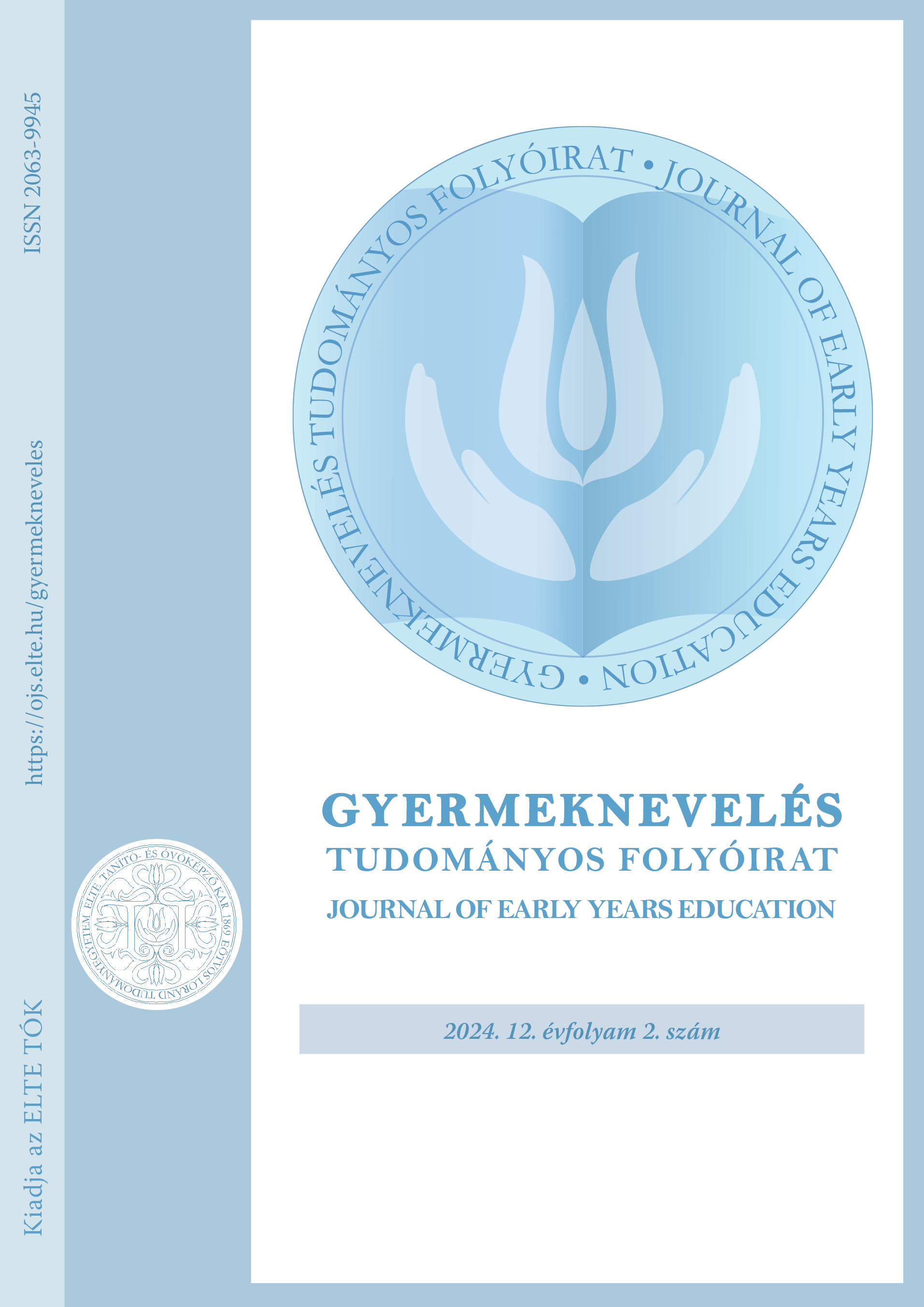Insights into early-childhood educators’ perceptions of children
DOI:
https://doi.org/10.31074/gyntf.2024.2.265.305Keywords:
early childhood educators’ perceptions of children, views about parents, nursery, narrative interview, qualitative content analysisAbstract
This study concerns the views of early childhood educators about children and attempts to interpret the narrative patterns that reflect the child’s perception of the early childhood educators interviewed. Our sample includes 15 early childhood educators who have worked in nurseries for several decades. In our qualitative research, we used the method of individual oral questioning, including the narrative interview technique. Our computer-assisted qualitative data analysis was carried out using the content analysis software Atlas.ti, which is based on grounded theory. The analysis of the narrative interview texts is based on the analysis strategy and coding logic developed by Glaser (1992). The conceptual framework of our research is Pukánszky’s concept of the child, which serves as a guide when analyzing the narrative interviews. In the process of inductive category creation, we were faced with a large amount of data, during the substantive coding of which we categorized the concept indicators and based on this, we interpret our results in terms of four main categories (Society, The nursery, The early-childhood educators, The family/The child). These main categories are intertwined, so the four main categories can be interpreted in relation to each other. In the present study, the family/child category is presented to describe the perception of children by early-childhood educators. As well as examining the views about children, the views of the parents were also revealed to us, the analysis of these patterns was helpful in getting to know and interpreting the children’s perception of the early-childhood educators. In early-childhood educators’ narratives, the effects of social changes, digitization and the stimulus-rich environment on children and families are evident throughout. The early-childhood educators interviewed unanimously point out that the emotional state and behavior of today’s children reflect the imprint of these influences. The characteristics of idealized childhood are also shown in the narratives, so in addition to the early-childhood educators’ perception of children, their image of children also emerges from the interviews.Downloads
References
Bartlett, F. C. (1985). Az emlékezés. Gondolat Könyvkiadó.
Bencsikné Molnár, R. (2023). Pedagógusok gyermekfelfogása. Tanítók gyermekekről vallott nézetei életpályájuk narratívának tükrében. Doktori értekezés. DOI-azonosító: 10.15476/ELTE.2023.168
Buckingham, D. (2002). A gyermekkor halála után. Helikon Kiadó.
Elekes, Gy. (2018). Narratív életinterjú módszere a társadalomtudományok kvalitatív kutatásában. Szociálpedagógia, 6(1)1, 42–51.
Elkind, D. (2001). The Hurried Child.
Glaser, B. G. (1992). Basics of Grounded Theory Analysis. CA: Sociology Press.
Golnhofer, E. & Szabolcs, É. (2005). Gyermekkor: nézőpontok, narratívák. Eötvös József Könyvkiadó.
Gyáni, G. (2000). Emlékezés, emlékezet és a történelem elbeszélése. Napvilág Kiadó.
Jenks, Ch. (1996). Childhood. Routledge. https://doi.org/10.4324/9780203129241
Kéri, K. (2002). Gyermekképünk az ötvenes évek első felében. Iskolakultúra, 12(3), 47–59.
Krippendorff, K. (2012). Content Analysis: An Introduction to Its Methodology (3rd ed.). Thousand Oaks, Sage Publications.
Kovács, É. (é.n.). Interjús módszerek és technikák. In Feischmidt, M., Kvalitatív módszerek az empirikus társadalom és kultúrakutatásban. Szabadbölcsészet. http://mmi.elte.hu/szabadbolcseszet/mmi.elte.hu/szabadbolcseszet/index72c4.html?option=com_tanelem&id_tanelem=835&tip=0 (2024. 05. 13.)
Kovács, É. J. (2015). Az emlékezet szociológiai elméletéhez. In Bodor, P., Emlékezés, identitás, diszkurzus. Pszichológia és társadalom (pp. 207–230). L’Harmattan Kiadó.
Kucsera, Cs. (2008). Megalapozott elmélet: egy módszertan fejlődéstörténete. Szociológiai Szemle, (3), 92–108.
Mitev, A. Z. (2012). Grounded theory, a kvalitatív kutatás klasszikus mérföldköve. Vezetéstudomány, 43 (1), 17–30. https://doi.org/10.14267/VEZTUD.2012.01.02
Mitev, A. (2015). Grounded Theory. In Horváth, D. & Mitev, A., Alternatív kvalitatív kutatási kézikönyv (pp. 85-126.). Alinea Kiadó.
Montgomery, H. (2009). An Introduction to Childhood: Anthropological Perspectives on Children’s Lives. Wiley-Blackwell, West Sussex.
Postman, N. (2000). The Disappearance of Childhood. Vintage Books.
Prout, A. (2005). The Future of Childhood. Toward the interdisciplinary study of children. Routledge Falmer. Taylor & Francis Group. https://doi.org/10.4324/9780203323113_chapter_5
Pukánszky, B. (2005). A gyermek a 19. századi magyar neveléstani kézikönyvekben. Iskolakultúra-könyvek 28.
Pukánszky, B. (2001). A gyermekkor története. Műszaki Könyvkiadó.
Pukánszky, B. (2018). Gyermekkép, romantika, „romantikus gyermekkép”. In Sárkány, P. & Schwendtner, T. (Eds.), A filozófia lehetséges szerepei a neveléstudományban (pp. 37–50). Eszterházy Károly Egyetem Líceum Kiadó. http://publikacio.uni-eszterhazy.hu/3691/ (2024. 05. 13.)
Sántha, K. (2013). A harmadik paradigma a neveléstudományi vizsgálatokban. Iskolakultúra, 23(2), 82–90.
Sántha, K. (2017). A trianguláció-tipológiák és a Maxqda kapcsolata a kvalitatív vizsgálatban. Vezetéstudomány, 48(2), 33–40. https://doi.org/10.14267/VEZTUD.2017.12.04
Sántha, K. (2020). Abdukció a kvalitatív tartalomelemzésben. Neveléstudomány, (2), 26–36. https://doi.org/10.21549/NTNY.29.2020.2.2
Szabolcs, É. (1999). Tartalomelemzés a gyermekkortörténet kutatásában: gyermekkép Magyarországon 1868-1890. Nemzeti Tankönyvkiadó.
Szabolcs, É. (2001). Kvalitatív kutatási metodológia a pedagógiában. Műszaki Könyvkiadó.
Szabolcs, É. (2011). Gyermekből tanuló. Az iskolás gyermek, 1868-1906. Gondolat Kiadó.
Vajda, Zs. (2009). Siettetett gyerekek. Iskolakultúra, 19 (9), 3–15.
Vértesi, L. (2004). Oral history. A szemtanúként elbeszélt történelem lehetőségei. Aetas, 19 (1), 158-172.
Winn, M. (1990). Gyerekek gyermekkor nélkül. Gondolat Kiadó.
Downloads
Published
How to Cite
Issue
Section
License
Copyright (c) 2024 Author

This work is licensed under a Creative Commons Attribution-NonCommercial-ShareAlike 4.0 International License.

